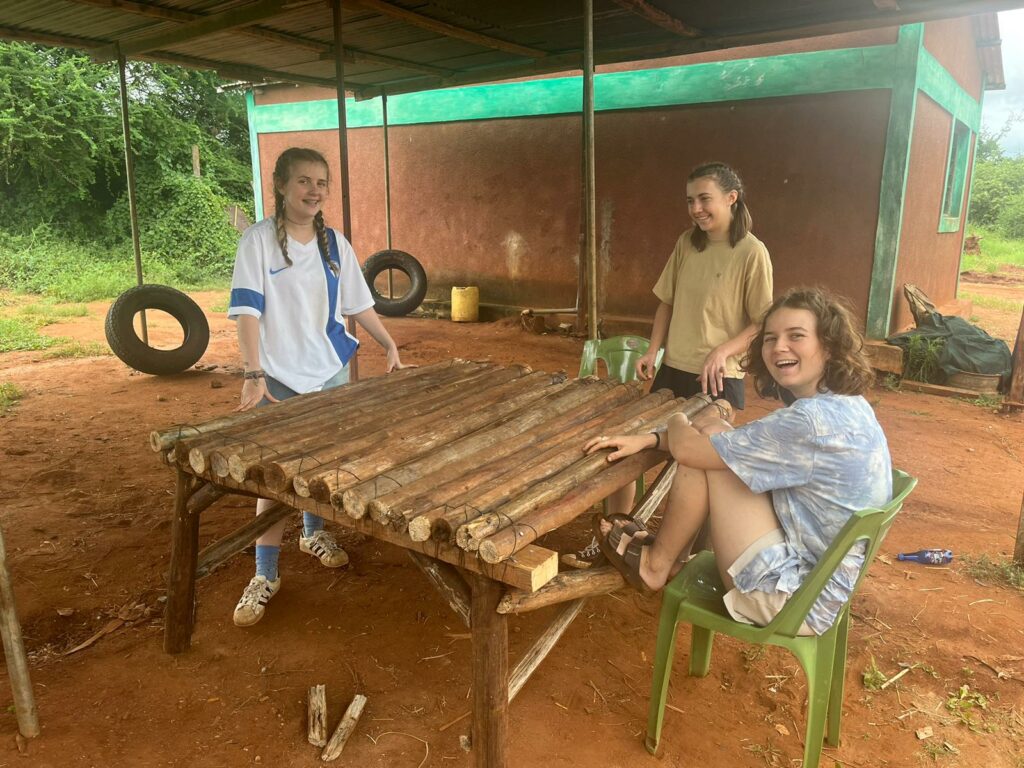Steiner's school Mission in Kenya
High school students from the Steiner school of Geneva went to Kenya for three weeks and lent a hand to our various partners there. On the program: maintenance work at the LUMO Sanctuary and patrol with the rangers, meeting with students from the Voi polytechnic school and carrying out France-Kenya school correspondences. No time to be bored!
Students used their artistic talent to beautify the base camp of rangers and volunteers at the LUMO Conservancy by creating a fresco highlighting emblematic animals of the sanctuary.
The fresco also helps raise public awareness of the diversity of local wildlife and the importance of its preservation.
The mural immediately caught the attention of visitors and local residents !
A total of 7 half-days of work !
The Steiner students took their paintbrushes to the CIT again to beautify the French room.
The students built a table with Ssecond hand materials found around the base camp, a few scattered logs, a bit of wire, and a few hours of work to make life at camp more comfortable ! This table will be used by volunteers and rangers to create a friendly space for outdoor meals.
Great teamwork!

Over two half-days, the students and rangers refreshed the signage system at the entrance to the sanctuary, thus improving the reception of visitors and preventing them from venturing into sensitive areas.
Additionally, the repainted signage provides a positive image of the sanctuary, reflecting its commitment to quality and safety.
While discussing with the rangers and emphasizing the importance of investing the strength of young people in solidarity projects, the Lumo team mentioned the repair of the dirt road from the “main gate” to the asphalt road, 2km. In fact, it required the addition of sand in order to level it and fill the potholes, thus facilitating the movement of residents and visitors. When it rains, this road is very slippery and almost impassable.
We therefore took advantage of having a lot of labor to renovate the road ! For three days over 2.5 hour slots, the group armed itself with tools to fill entire trailers with earth in order to spread it on the road.
The students accompanied one of our volunteers, a French ethnobotanist, to create a botanical trail for the sanctuary.
On site, the flora specialist rangers, the group of students and our volunteer identified 44 species of plants and created 80 recipes from them. The project, developed at the LUMO sanctuary, aimed to enrich knowledge of local biodiversity and through this trail is to introduce visitors to the flora as well as the fauna.
Student-made signs list identified plants and provide educational information about the species.
A second mission is planned to continue research and strengthen the positive impact on local biodiversity.
Sens Solidaires supports the development of the Elephant Dung Paper Factory located at the Kongoni school, under the direction of Professor Flavian Mwandiga.
Steiner students distributed school supplies on site and were introduced to the technique of making paper from elephant dung, an activity that promotes elephant conservation.
By transforming a natural waste into a valuable resource, this project contributes to the awareness and commitment of local communities to the protection of elephants. The finished products not only serve educational purposes but also generate income, thereby strengthening conservation initiatives.
Thanks to the help of our volunteer ethnobotanist and rangers, the students planted 70 trees in Lumo including :
-5 Azadirachta indica or Neem
-4 Flamboyants
-6 Jacarandas
-2 Oleanders
-3 Coleus
-25 Acacias niloticas
-25 Cassia siema
At CIT, on National Tree Planting Day, students planted more than 186 trees, including East African yellow wood, Sycamore fig, Brachylaena huillensis, Croton megalicarpus, and African cherry.
For three mornings, CIT pupils and students built a greenhouse with plastic bottles collected and cleaned by a local association.
Indeed, the construction of this greenhouse raises community awareness of environmental problems linked to plastic waste and the importance of recycling, an important issue in the region and one that the CIT has been addressing in recent years.
This project therefore has many interests, ranging from reducing plastic waste to promoting sustainable agriculture, including community engagement and innovation.
The greenhouse will be used to store the establishment’s nursery plans while awaiting their planting.
In collaboration with Kenyan students from the “Biodiversity Club”, the beginnings of an agro-ecological farm project were launched.
With their experience and skills, our volunteers contributed to the implementation of this ambitious project which aims to cultivate fruits and vegetables on a 3-hectares plot within the university campus.
The project will take place in three stages: the first, already started by the Steiner students, covers half a hectare. The second stage will see a one hectare extension, followed by a 1.5 hectares expansion to reach the final size of 3 hectares.
To support this initiative, a vermicompost will be installed to produce natural fertilizer, thus guaranteeing the exclusive use of natural processes and the eradication of chemical products. In addition, the chicken farm, currently located elsewhere, will be moved to this plot to complete the agro-ecological ecosystem.
The group spent two afternoons in primary schools in Kenya to carry out the correspondence project between French and Kenyan schoolchildren and to donate school supplies.
These exchanges allowed the children to discover, through the letters received and the meeting with the high school students, other traditions and ways of life, developing tolerance and open-mindedness. Indeed, corresponding with foreign peers arouses students’ curiosity and encourages them to ask questions and learn more about the lives of their correspondents !
In addition, the exchanges allow students to discuss the local impacts of climate change and to share ideas and solutions by putting international cooperation at the heart of the challenge.
